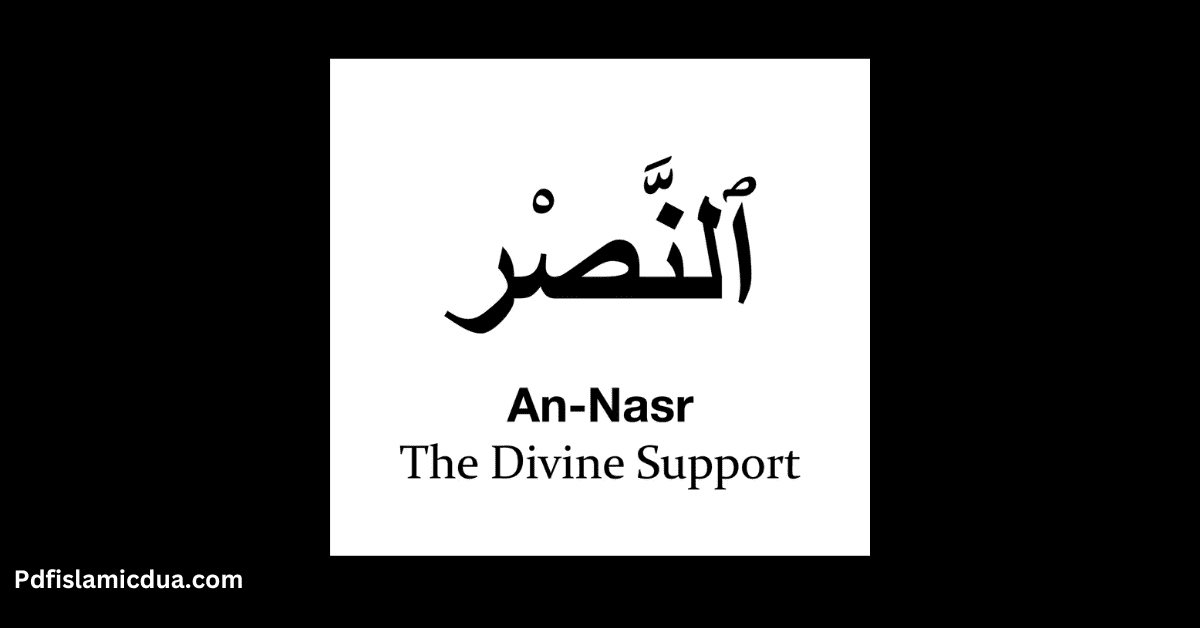Blog
an nasr surah, ijaza nasrullah surah, ijaza nasrullah surah in english, Iza Ja Nasrullah Surah in English, iza ja nasrullah surah in english translation, izaja surah, izaja surah english, quran, surah, surah al nasr, surah an nasr, surah an nasr english, surah an-nasr, surah ijaza nasrullah wal fath, surah izaja nasrullah he, surah nasr, surah nasr english, surah nasr for kids, surah nasr full, surah nasr in english, surah nasr in hindi, tilawat e quran surah an nasr
pdfislamicdua
0 Comments
Iza Ja Nasrullah Surah in English & Arabic PDF
Surah Nasr (Iza Ja Nasrullah Surah ) is the 110th Surah of the Qur’an. It is titled in English “Help” or “Divine Support” and is composed of 3 verses.
Download the Surah or Read online
Iza Ja Nasrullah Surah in English
| Arabic | Transliteration | Translation |
|---|---|---|
| بِسْمِ اللَّهِ الرَّحْمَـٰنِ الرَّحِيمِ | Bismillah hir-Rahman ir-Raheem | In the name of Allah, the Most Compassionate, the Most Merciful. |
| إِذَا جَاءَ نَصْرُ اللَّهِ وَالْفَتْحُ | Iza jaa-a nasrul-lahi walfath | When the victory of Allah has come and the conquest, |
| وَرَأَيْتَ النَّاسَ يَدْخُلُونَ فِي دِينِ اللَّهِ أَفْوَاجًا | Wa ra’aytannaasa yadkhuloona fee deenillahi afwaja | And you see the people entering into the religion of Allah in multitudes, |
| فَسَبِّحْ بِحَمْدِ رَبِّكَ وَاسْتَغْفِرْهُ إِنَّهُ كَانَ تَوَّابًا | Fasabih bihamdi rabbika wastaghfir, innahu kaana tawwaba | Then glorify the praises of your Lord and seek His forgiveness. Indeed, He is ever Accepting of repentance. |
This Surah celebrates the eventual victory and spread of Islam, urging the Prophet Muhammad (ﷺ) to praise and seek forgiveness from Allah, recognizing His infinite mercy and acceptance of repentance.
Recent Posts
- Lilafi Quraish Surah in English & Arabic Transliteration PDF
- Alam Tara Surah PDF-Surah Al-Fil Transliteration
- Wailuli Kulli Surah in English Meaning-Surah Al-Humaza
- Wal Asr surah meaning in English and Benefits PDF
- Alhakumut Takasur Surah PDF in English, Arabic & Transliteration
Hadith on Surah Nasr
A famous Hadith explains that when Surah Al-Nasr was revealed, Prophet Muhammad (PBUH) understood that his mission was near completion and that he would soon leave this world.
Ibn Abbas narrated that after this Surah, the Prophet made extensive remembrance of Allah and sought His forgiveness, reflecting the guidance within the Surah to praise Allah and seek forgiveness as an act of gratitude and preparation.
A’isha reported:
The Messenger of Allah (ﷺ) often recited these words: “Hallowed be Allah and with His praise, I seek the forgiveness of Allah and return to Him.” She asked, “Messenger of Allah, I see that you often repeat ‘subhan allahi bihamdihi astagh firullahi watubuilaih.’” He replied, “My Lord informed me that I would soon see a sign in my Ummah, so when I see it, I often recite these words: ‘Hallowed be Allah and with His Praise, I seek forgiveness of Allah and return to Him.’ I saw it (when this verse was revealed): ‘When Allah’s help and victory came… celebrate the praise of Thy Lord and ask His forgiveness. Surely He is ever returning to Mercy.’”
When to Recite Surah Nasr
• In Salah (prayer) as part of the Qur’an recitation.
• Regularly for protection and as a reminder of Allah’s support.
• To seek Allah’s help in times of difficulty or challenges.
• To express gratitude after achieving success or receiving blessings.
Importance and Benefits of Surah Al-Nasr
1. Guidance on Gratitude and Repentance: Teaches the importance of praising Allah and seeking forgiveness, even in times of victory, to stay humble and grounded.
2. Divine Support in Achievements: Reminds believers that all success comes from Allah, encouraging them to attribute accomplishments to His blessings.
3. Preparation for the Afterlife: Emphasizing repentance, it directs Muslims to prepare for their final meeting with Allah, as the Prophet understood his mission was complete after its revelation.
4. Reminder of Death: This Surah subtly signals the temporary nature of worldly life and achievements, urging believers to reflect and seek Allah’s forgiveness.
Conclusion
Surah Al-Nasr teaches humility, gratitude, and preparing to meet Allah. This short chapter reminds us to keep our hearts connected to Allah, especially when we succeed, and to always ask for His forgiveness. Its message encourages Muslims to remember Allah in both happy times and in reflection.














Post Comment